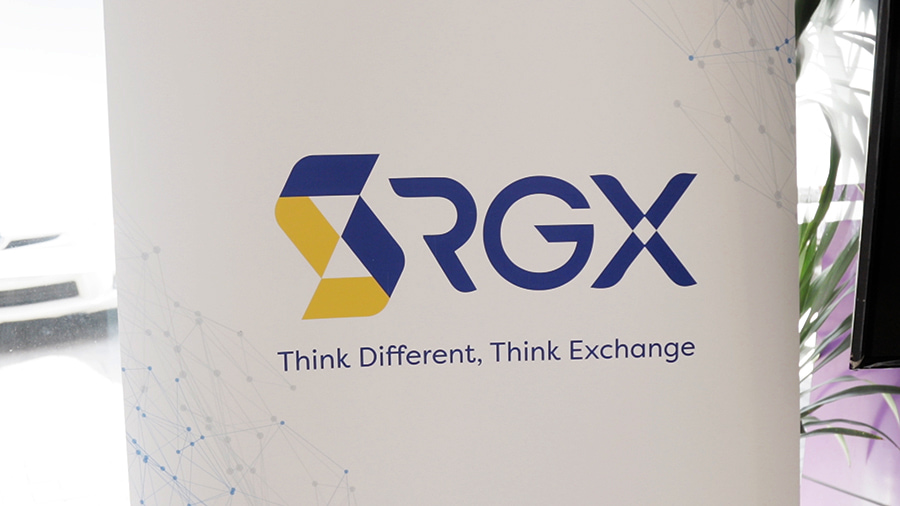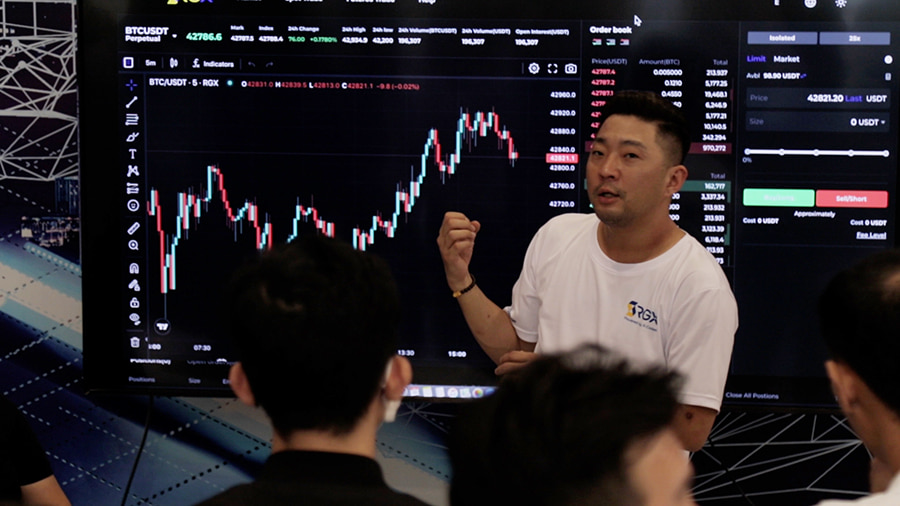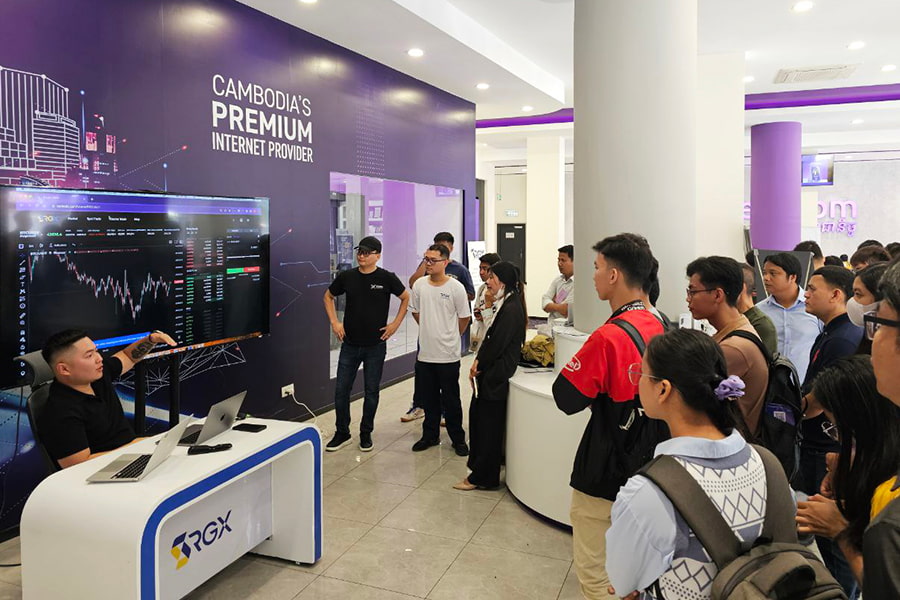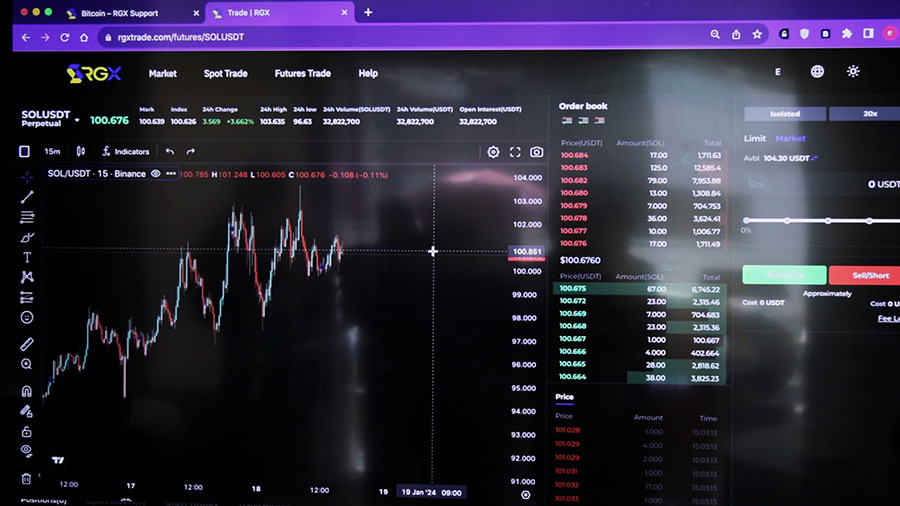The financial landscape of Cambodia enters a new era with the launch of Royal Group Exchange (RGX), the nation's first licensed digital asset exchange. B2B Cambodia caught up with Thomas Schings, Senior Manager at RGX, and Dave Lee, Founder and CEO of X-Codes – the tech company that helped build the exchange platform – to discuss Cambodia’s growing alternative finance market and to get clarity on some of the biggest questions surrounding Cambodia’s cryptocurrency laws and regulations.
RGX hosted a ‘Hello RGX’ event on January 18, 2024, at the EZECOM building on Sihanouk Boulevard, the first of many planned events this year to promote the platform to members of the public and provide a chance to sign up and take part in the digital asset exchange. We caught up with Schings and Lee during the event to discuss RGX at more length.
RGX And The Growing Interest And Demand For Digital Assets In Cambodia
Clarifying the definition of ‘digital assets’, Schings specified that the majority of assets currently listed on the exchange are cryptocurrency coins or tokens representing different projects worldwide.
“The ones we currently have listed are the most liquid ones globally… where we know those projects are not scams, that's why we chose to start with those,” said Schings. “Later on, we are also thinking about the possibility of adding NFTs and other tokens, but for now, it's tokens and coins.”
When asked why Royal Group decided to launch RGX in Cambodia now, he explained that there has already been a growing recorded interest in cryptocurrencies and blockchain technology in the country, particularly following the COVID-19 pandemic when people spent more time at home and on the internet exploring new digital spaces.
“We've seen from numbers that there is a massive active community [in Cambodia],” stated Schings.
To some extent there's this misconception that crypto or blockchain is illegal in Cambodia, which is not the case, only the banks are not allowed to operate or deal with crypto businesses. For individuals, it's not illegal to deal in any digital assets, so we’ve seen there are actually several hundred thousand active users in the blockchain space already in Cambodia, and millions of dollars being transacted every day outside any regulated space here.
He added that the locally-based and regulated nature of the platform will be a benefit for users in Cambodia as they can have a greater sense of security knowing they are relying on an exchange platform that is officially licensed, and which has a customer support team that can respond to queries in Khmer as well as in person at their office.
“We didn't come up with this a week ago, we've been working with the regulator for over a year now to make this happen and to find the right space, to find the right regulations and guidelines,” Schings added. “While there isn't a fully built-out law yet, there is a rulebook which we follow under the sandbox licence issued by the Security and Exchange Regulator of Cambodia (SERC).”
How Does RGX Fit Into Cambodia’s Laws And Regulations On Cryptocurrency?

RGX is currently licensed by, and operating within, the SERC’s ‘Fintech Regulatory Sandbox’, a legal framework developed in partnership with Binance that allows companies to explore new and innovative financial services and products. “It's often better to regulate a space rather than trying to ban it, especially if something is as decentralised as blockchain and technically impossible to ban,” said Schings.
“We are thankful to the SERC… for creating the [FinTech Regulatory] Sandbox License, which gives the opportunity for companies to experiment with new technologies… giving us the opportunity to be here locally, to operate this platform.”
Even after working with the regulator for over a year to formulate the right operational guidelines for the digital asset exchange, he confirmed that RGX will need to continue regularly reporting to the SERC who will “monitor all transactions, see the volume [of trade], and dictate, or approve, what assets are being traded.”
While it is true that banks in the Kingdom – under the regulation of the National Bank of Cambodia (NBC) – are currently not authorised to conduct cryptocurrency transactions, Schings stated that RGX is still exploring opportunities to establish bank linkages for deposits and withdrawals in the future.
“RGX is 100% owned by Royal Group, and I think a lot of people in Cambodia know that Royal Group itself is not an unknown player in the banking sector as well, so we are making strides towards linking RGX directly to the banks,” he explained.
The platform, as we've launched so far, enables you to transfer existing assets to RGX and enables you to trade on the spot between other digital assets and to trade future digital assets. To withdraw or to deposit to fiat currency, we currently haven't enabled that, but we are planning to launch P2P (peer-to-peer) to enable users to trade between themselves, also using fiat... by the month of February.
“We hope we can find a regulatory space, and, if needed, new guidelines, new rules… from both our regulator, the SERC, but potentially also the NBC, to make it so that banks can operate both with us and within the general space of alternative finances," added Schings.
How Does RGX Ensure A Safe And Secure Digital Asset Exchange For Users In Cambodia?

Schings and Lee helped to break down some of the main security measures in place that ensure RGX is adhering to international regulatory standards on the prevention of illegal transactions and on the protection of users’ assets and data, particularly in light of rising concerns about cybersecurity in the crypto industry.
“Any user who joins RGX and opens an account has to go through our KYC (Know Your Customer) process, which verifies their identity,” explained Schings. “This means people have to take a selfie, a picture of their ID card or passport, to verify their account, only then they are allowed to trade. [This process] also verifies that no users from sanctioned countries or people on any sanctioned lists can enter RGX.”
Furthermore, we also partnered with some of the biggest providers in the space, namely ‘Chainanalysis’, to do transaction monitoring, so we ensure that we follow all anti-money laundering (AML) laws and that money is not being used for funding of terrorism or drug-related businesses… The blockchain itself is monitored in that realm, but we ensure we follow all the laws similar to a bank, and the SERC is strictly monitoring us and working with us, so that we can enable and ensure that we are fully compliant with all the laws.
“As an exchange, the most critical component is… wallet management,” continued Lee. “At X-Codes, our specialty is working with industry leaders and utilising their tech and integrating that together under one platform. Rather than choosing one, we're a platform that merges and is a hybrid of all industry tech leaders…
"So for our wallet management, we work with the industry leader, Chainanalysis, as Thomas mentioned, to provide the safest security, but also ensure every user's assets are under a safe fund of Binance, so all assets are protected regardless of whether they get hacked or not.”
Lee shared that X-Codes has a long history of working together with Chainanalysis to provide technical support for a number of different platforms in several countries, including Mongolia (where X-Codes owns the biggest crypto exchange and operator in the country), Kazakhstan, and the Philippines.
Implementing a Chainanalysis KYT (Know Your Transaction) system, we monitor every transaction on RGX, looking for transactions that are against sanction or that seem abnormal. The Chainanalysis platform has a list of wallet addresses that have already been red-flagged with Interpol, those connected with terrorism, for example, and those against AML laws. RGX is operating within this ecosystem…
“We also have anti-phishing mechanisms… and we are also at the EZECOM [head office] today for a reason,” said Schings, speaking of the chosen venue for the first ‘Hello RGX’ event.
“We use EZECOM as our partner for data storage, so while the platform itself operates in the cloud on Amazon Web Service (AWS), we do store all customer data in Cambodia locally as well.”
Watch Part 2 of B2B Cambodia’s interview with Thomas Schings and Dave Lee, CEO of X-Codes:
Advocating For More Education On The Blockchain And Financial Inclusion In Cambodia
While the RGX team expressed confidence in the size of Cambodia's active digital asset exchange community, both Schings and Lee agreed that the need to educate more people on blockchain technology and cryptocurrencies will be a major challenge for RGX to address.
Knowledge plays a key part in the blockchain space, which also ensures that people minimise risks, that people don't speculate, and that people don't enter this space thinking they become millionaires overnight. Education is one of the main things we commit to and... also the main thing to make Cambodia stand out in the long term, to make blockchain and digital assets flourish.
For that reason, he explained that RGX has also launched the ‘RGX Academy’ where some educational video material has already been published.
“A lot of it is currently in English, but we will also translate this material and continue creating videos," said Schings. "We also want to do more events like the [Hello RGX event] to get the community going, to have people come and ask questions and get interested in the space, but also to educate themselves in the space.”

“[When many people think of crypto], they immediately think that they're going to lose money because the risk parameter seems to be much more sensitive [than traditional forms of financing], but with proper education, information, and knowledge, I beg to differ,” asserted Lee. “If you study the market cap, the trading volume, the white paper, the meaning, solution and utility behind digital assets, and if you study the ecosystem [as a whole], it's relatively black and white.”
When asked if RGX plans to organise educational seminars or events at established institutions like schools or universities to strengthen their commitment to educating the public, Schings responded positively saying this is something the company is definitely interested in.
“Generally we are open to everyone [joining the exchange], but there's no doubt that digital assets are most interesting… for the younger generation,” he said. “We definitely wish to get into contact with universities and start programs at schools where we can educate them and hold events where students can meet us and learn about this space.”
The majority of RGX’s planned outreach events and educational activities are currently centred around Phnom Penh and its technologically-savvy youth population. Lee, however, firmly declared his belief that access to the blockchain should be for everyone.
“Personally, I am not looking for the top 10 per cent of people to have more access, because simply all you need is a smartphone and access to the internet, then you have the entire world in the palm of your hand,” he said.
“So when you have a technology that can offer the opportunity of financial freedom, my advocacy is to reach out to 90 per cent of Cambodia’s total population… Sure, we have to start within the capital and targeting the next biggest cities… but I believe that in today's world, where the internet is accessible nationally, as long as a user in Cambodia has a smartphone and access to the internet, RGX is available for you.”
The Future Of RGX: Pursuing Asset Tokenisation

At the RGX launch event on January 8, 2024, Schings was quoted saying that RGX plans to introduce an ‘RGX Token’ and enable asset tokenisation in the future, which would include real estate trading on blockchain-based securities platforms.
On this matter, Schings confirmed that there are different opportunities RGX is currently exploring, including a feasible introduction of RGX Tokens, but he was not able to confirm an estimated time frame for when this would potentially go live.
Everything we do has to go hand in hand with our regulator, so it has to be approved, it has to be guided, and it has to be monitored. RGX Token is likely to come. When, I can't say yet, but we are exploring and working on that.
Real estate tokenisation – which Schings explained entails digital tokens on the blockchain representing what are essentially land titles that provide ownership rights over the corresponding physical assets – is also something that could be operationalised once all specific regulations are formulated.
“Being a part of Royal Group, we have a lot of interesting real estate assets as well, which might be interesting to open up, via real estate tokenisation, to a global platform,” he said. “For places like Sihanoukville, and even Phnom Penh, where there are a lot of unfinished buildings, blockchain and asset tokenisation could really help to innovate and generate new inflows of capital into Cambodia.”